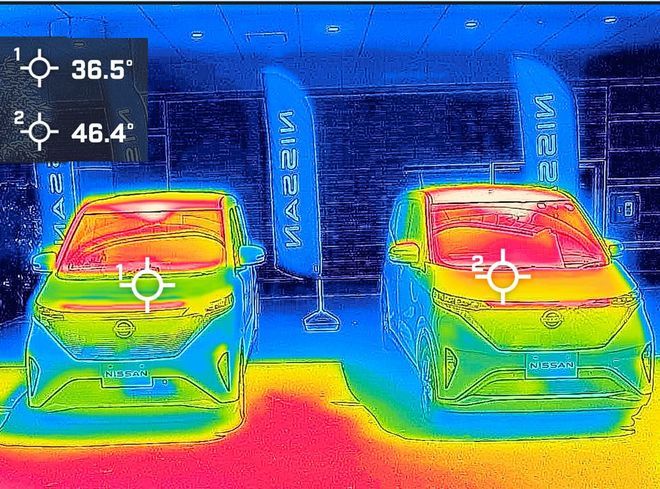Nissan Motor Co. said it has developed a new type of paint that significantly reduces the temperature inside vehicles parked in direct sunlight.
The surface of a car coated with the innovative material remains up to 12 degrees cooler than that of a vehicle with standard paint, tests showed.
The company said the coating material can help rein in the temperature rise not only on the car’s body but also in the vehicle when exposed to direct sunlight.



wouldn’t this also work on buildings? pavement?
No, only Nissans. It says right there.
Probably yes, but it may not actually be doable. Not just because of how much there is to paint, but because the energy doesn’t just evaporate. It’s got to go somewhere. In this case I’m assuming it’s reflected, even if diffused. If everything does this, things that don’t (people, cars, pets, etc) will get all that extra energy.
Wouldn’t want to end up in a situation like this: https://www.businessinsider.com/death-ray-skyscraper-is-wreaking-havoc-on-london-for-a-few-totally-insane-reasons-2015-7
It can reflect it out to space. It is possible to make paint the keeps things below ambient. Obviously you’re correct, but only for things not facing upward. Upward facing things will bounce the energy back away from Earth.
https://youtu.be/N3bJnKmeNJY?si=drxjIM8U_MAcQLQH
Oh great so now the rest of the universe has to deal with it. Really just kicking the can aren’t we
The amount of folks who have melted their shitty low quality thermoplastic patio furniture with their sliding glass windows will always amuse me, but overall I don’t consider IR radiation to be a big problem. Using a bunch of VOCs to paint everything and pollute a city would be though.
You ever seen that curved building that focused the sunlight into a spot in front of it and melted cars? Lol
You mean the one in the comment that the comment you replied to mentioned and linked to?
Lol oops didn’t click that link. But yes
Ok, so don’t paint it on any concave surfaces. Most buildings have flat or convex surfaces.
Dude your mom only has convex surfaces
https://youtu.be/N3bJnKmeNJY?si=drxjIM8U_MAcQLQH
great video. Its wild that it is functioning as an IR emitter and just beaming things into space.
Is metal paint and concrete paint the same thing? I’m not a painter
Ultimately, they can be, but there’s lots of differences between them once they reach the bucket you buy. They have different adhesion qualities, but that could be addressed with an appropriate primer. They have different final finish surface requirements, which could be an issue for how the paint works. I remember seeing dragonfly-wing-style paint that was white when viewed perfectly straight buy blue when viewed at any off angle due to a microscopic vertical grid of blue walls. There may also be a required clearcoat component that may not be compatible between the two surfaces. Metal paint is also designed to handle the flex of metal where as concrete paint would barely be concerned about that but possible address crumbling instead.
Edit: and after reading the article, it’s a radiative-cooling paint rather than a reflecting coating. Concrete has a much lower thermal conductivity so this may not be effective in transferring heat out of the concrete.
Metal paint is concrete paint. Microsoft paint is abstract paint. This comment is metaphorical paint.
You mean metaphorical pain. Jk